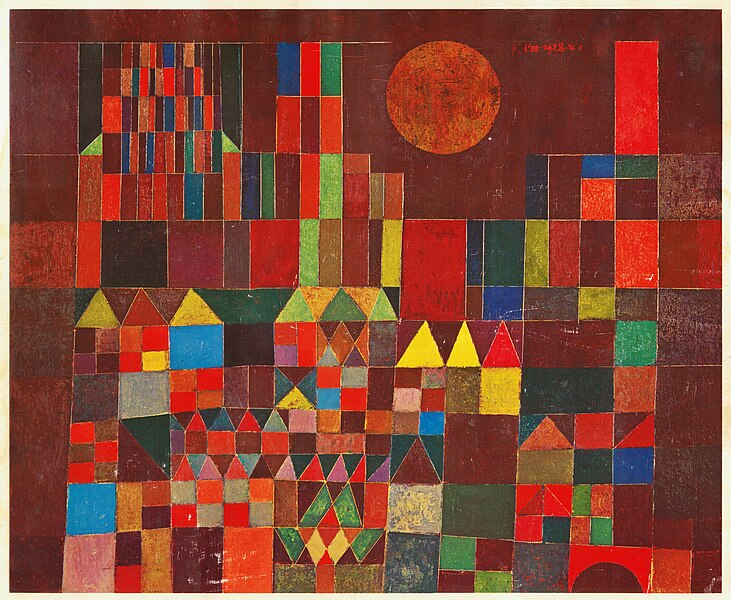The aim of kidzdeutsch is to provide a collection of activities and information to support younger children in their learning of German.
Sonntag, 9. September 2012
Samstag, 18. August 2012
sprichwort der woche: wenn die katze aus dem haus ist, tanzen die mäuse auf dem tisch
Wenn die Katze aus dem Haus ist, tanzen die Mäuse auf dem Tisch.
I have plenty of experience of this proverb, in its literal sense.
Let's look at it word by word.
Wenn is simply when. A soundalike and lookalike word.
Die Katze is the cat.
Here aus dem Haus means out of the house.
The ist at the end of the first clause means is. So the first clause put together means: When the cat is out of the house.
The second clause begins with a verb: tanzen. This means dance.
Next we have another animal - die Mäuse. The mice.
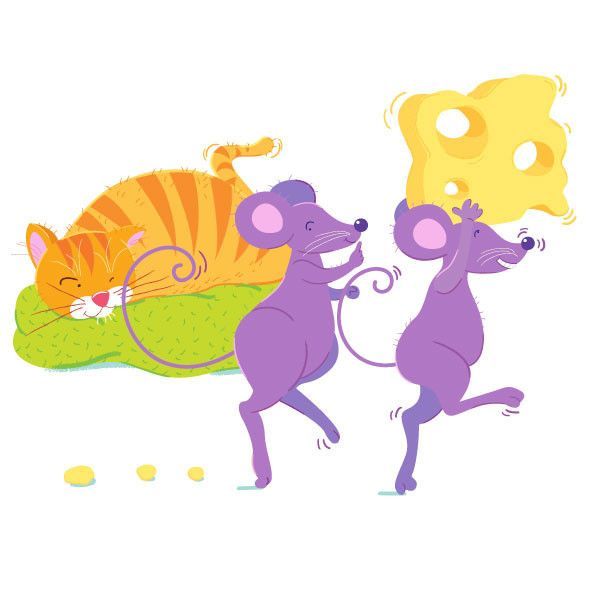
The second clause means: the mice dance on the table.
The English equivalent of this old German proverb is When the cat's away the mice will play.
I live in an old house with plenty of tiny little gaps in the walls. Mice find it very easy to squeeze in and out of these gaps. A few years back when my dear old ginger cat Ollie died we were quite slow to find a replacement for him. Gradually we noticed increasing numbers of mice scurrying around the house. Gnawing their way through food containers and nibbling little holes into paper packages. As the winter got colder the mice got more numerous, and seemed quite well fed. We even hung Christmas chocolates up from the ceiling so the mice couldn't get at them. We now have a lovely sleek black cat who does an excellent job of keeping the mice at bay. Her name? Mouser!
Donnerstag, 9. August 2012
sprichwort der woche: eine schwalbe macht noch keinen sommer.
 |
| junge Nestlinge |
Eine Schwalbe macht noch keinen Sommer.
Eine Schwalbe
OK, the bird in question. Die Schwalbe ist etwa 17 cm lang. Der Rücken ist metallisch glänzend blau-schwarz. Die Unterseite ist rahmweiß. Die Schwalbe verbringt den Sommer in Europa und den Winter in Afrika.
Have you guessed what it is yet? You're right, it's a swallow.
macht
This is an example of a word where German ch becomes k in English.There are a number of these, including Milch (milk), Buch(book), Koch (cook). Macht means makes.
noch keinen Sommer
You probably know that Sommer means summer. The noch keinen is a little trickier. Literally kein means not a or none. And here noch is used to mean yet.
The whole proverb then means roughly one swallow makes not yet a summer.
The English equivalent of this proverb is one swallow doesn't make a summer. This wise old saying is generally used to warn people not to get too excited about the smallest hint of good things to come. Swallows usually arrive in Europe when the weather begins to get warmer at the end of spring. They come to Europe to breed and food is plentiful for them during our summer months. After the breeding season they fly with their young to Africa in search of warm weather and food. To find out more about swallows you could read Dear Olly by Michael Morpurgo, the story of a swallow called Hero and his journey of thousands of miles to catch up with his family. Are there any swallows' nests near where you live?
Still not sure how to identify a swallow? Look at this little clip of a female swallow looking after her young.
Dienstag, 7. August 2012
sprichwort der woche: der spatz in der hand ist besser als die taube auf dem dach
 |
| Drei junge Spatzen |
Many German proverbs have a direct equivalent in English. Proverbs are short and well known sayings and usually they are very old and nobody is quite sure about their origin.
Look at this German Sprichwort (proverb).
Der Spatz in der Hand ist besser als die Taube auf dem Dach.
Der Spatz is a common bird in Germany as well as Britain. Small and brown with a cheerful call ,you may already have guessed it is a sparrow. So der Spatz in der Hand is the sparrow in the hand.
The next part of the sentence ist besser als is one of those German phrases that sound very like what they mean in English. Ist means is; besser means better; and als means than.
Another common bird is die Taube. Visitors to British cities can see dozens of these birds, and Trafalgar Square in London is known for its huge numbers. They are large and grey and their call is like a soft hooting. Yes, eine Taube is a pigeon.
Now we come to auf dem Dach. This simply means on the roof.
So literally our German proverb means The sparrow in the hand is better than the dove on the roof. In English we have a very similar proverb - A bird in the hand is worth two in the bush.
Both proverbs mean roughly the same thing; it is better to have something for certain than to try and get something which may be more valuable if it is out of your reach.
Freitag, 3. August 2012
die olympischen Sommerspiele

This alphabetical list of the Olympic sports played in the summer games is in German. How many can you name in English?
- Badminton
- Basketball
- Bogenschießen
- Boxen
- Fechten
- Fußball
- Gewichtheben
- Handball
- Hockey
- Judo
- Kanusport
- Leichtathletik
- Moderner Fünfkampf
- Radsport
- Reitsport
- Ringen
- Rudern
- Schießen
- Schwimmsport
- Segeln
- Taekwondo
- Tennis
- Tischtennis
- Triathlon
- Turnen
- Volleyball
Look below to see if you were right.
Badminton Basketball Archery Boxing Fencing Football Weightlifting Handball Hockey Judo Canoeing Track and Field Modern Pentathlon Cycling Riding Wrestling Rowing Shooting Swimming Sailing Taekwondo Tennis Table tennis Triathlon Gymnastics Volleyball
For more information about Leichtathletik events click here.
For more information about Leichtathletik events click here.
Freitag, 20. Juli 2012
paul klee: burg und sonne
Paul Klee was born in Switzerland in 1879. He trained as a painter in the Academy of Fine Arts, Munich. His father was a German music teacher and his mother a Swiss opera singer. Although he was trained musically and played the violin well he rebelled against his parents' wishes and decided to study fine art in Germany.
His style of painting was very distinctive. He liked to turn objects into simple geometric shapes when he painted them. As you can see, the above painting is made up of diamonds, squares, rectangles, triangles and one circle.
Klee's use of colour and shape makes his works very striking. I find the painting above Burg und Sonne (Fortress and Sun) quite compelling to look at.
Sonntag, 8. Juli 2012
word of the week: bratwurst
Are you a sausage-lover? If so a trip to Germany is right up your street! There are probably as many types of sausage as there are regions in Germany. Wikipedia lists 36 pages of sausage varieties and each page features a few sub-varieties.
Bratwurst is the most well-known sausage. There are over 40 different recipes for Bratwurst alone. The main ingredient is always chopped meat, usually pork, beef or veal, and flavoured with herbs and spices. The Nürnberger Rostbratwurst is similar in size to a British banger (whereas most German sausages are about twice the size) and is a pork sausage lightly seasoned with marjoram. They are traditionally grilled over a beechwood fire. In a pub they are served on a plate with plenty of delicious sauerkraut and eye-watering horseradish.
If you are in a hurry you can buy them from a street vendor at an Imbißstube. They are usually sold in threes inside bread rolls, slathered in hot German mustard.
Recently Germans have acquired a taste for Currywurst. This is simple and filling fast food, German style. One pork sausage, steamed then fried, is cut into slices and served with generous amounts of warm curry ketchup. This is simply what it sounds like - tomato ketchup blended with curry powder. The Currywurst is usually accompanied by chips or bread rolls.
 Currywurst probably owes its existence to British soldiers living and working in Berlin after World War Two. They used curry powder in their own cooking and it is thought that they traded the spicy seasoning with resourceful German entrepreneur Herta Heuwer. She then put a German spin on the traditional Indian flavours by mixing them with ketchup and serving her creation up with good old German sausage. It has been a firm favourite with young and old ever since.
Currywurst probably owes its existence to British soldiers living and working in Berlin after World War Two. They used curry powder in their own cooking and it is thought that they traded the spicy seasoning with resourceful German entrepreneur Herta Heuwer. She then put a German spin on the traditional Indian flavours by mixing them with ketchup and serving her creation up with good old German sausage. It has been a firm favourite with young and old ever since.
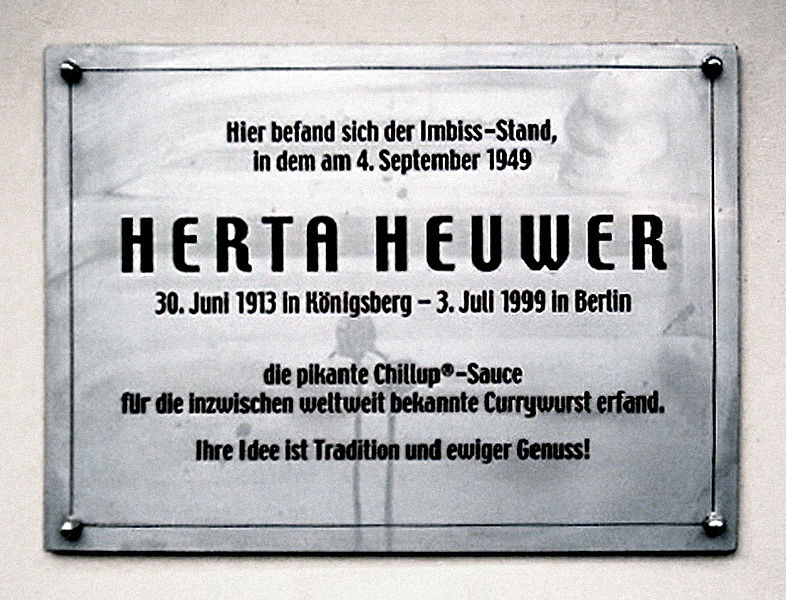 |
| Here stood the snack stand in which on September 4th 1949 Herta Heuwer invented the spicy Chillup® sauce for the now world famous Currywurst. |
Mittwoch, 4. Juli 2012
Louis Voki
Stop! Hier ist ein Update von Jorvik!
Matthew Voki
Wir singen "Wischi Wischi Waschi Wischi"
Beth and Emily Voki
Und dann unsere Lehrerin, die schaut uns alle an.
Kinder Voki
Wir sehn einen braunen Bären, einen roten Vogel, eine gelbe Ente, ein blaues Pferd, einen grünen Frosch, eine lila Katze, einen weißen Hund, ein schwarzes Schaf, einen goldenen Fisch...
Frau Leherin Voki
Ich seh viele Kinder, die schaun mir zu.
Goldener Fisch Voki
Ich seh eine Lehrerin, die schaut mir zu.
Schwarzes Schaf Voki
Ich seh einen goldenen Fisch, der schaut mir zu.
Weißer Hund Voki
Ich seh ein schwarzes Schaf, das schaut mir zu.
Lila Katze Voki
Ich seh einen weißen Hund, der schaut mir zu.
Grüner Frosch Voki
Ich seh eine lila Katze, die schaut mir zu.
Blaues Pferd Voki
Ich seh einen grünen Frosch, der schaut mir zu.
Gelbe Ente Voki
Ich seh ein blaues Pferd, das schaut mir zu.
Roter Vogel Voki
Ich seh eine gelbe Ente, die schaut mir zu.
Brauner Bär Voki
Ich seh einen roten Vogel, der schaut mir zu.
Abi Voki
Willkommen zu der Versammlung von Klasse 4.
Brauner Bär, wen siehst denn du?
Brauner Bär
The book can be read aloud and repeated by children as young as seven, and my Year 3 class have thoroughly enjoyed repeating the words and taking on different roles, as well as creating some original artwork for the different creatures in the book.
Take a look at the pictures and see if you can match them up to the words below:
weißer Hund
goldener Fisch
lila Katze
gelbe Ente
brauner Bär
roter Vogel
blaues Pferd
grüner Frosch
schwarzes Schaf
Samstag, 30. Juni 2012
Freitag, 29. Juni 2012
wort der woche: Honig
If you like your food you probably already know that Honig, the food of kings and paupers, is honey. The sweet treat that comes from the Honigbiene (honeybee) is an essential ingredient in a Honigkuchen and on Honigbrot.
 Honiggelb is a warm shade of yellow, the colour of Honigwabe. You could find a piece of Honigwabe inside a beehive. It is made up of tiny hexagonal cells which the Queen bee lays her eggs inside. Have you worked out what it is yet? Too right, it's honeycomb!
Honiggelb is a warm shade of yellow, the colour of Honigwabe. You could find a piece of Honigwabe inside a beehive. It is made up of tiny hexagonal cells which the Queen bee lays her eggs inside. Have you worked out what it is yet? Too right, it's honeycomb!And one last word. If you are grinning like a Cheshire cat (like the cat in Alice in Wonderland whose smile remained even after it had gone), then the Germans say du grinst wie ein Honigkuchenpferd (you are grinning like a honeycake-horse). I suppose if you were a honeycake-horse you'd have quite a lot to grin about.
Samstag, 16. Juni 2012
Wort der Woche: grün
A person who lacks experience might be grün hinter den Ohren or wet behind the ears as we would have it. A Grünschnabel is a young whippersnapper, a delightful term in both languages.
Green places are much loved parts of the German landscape and the outside of cities is often surrounded by a grüner Gürtel, a green belt of farmland, parks and open country where development is not allowed. In the middle of a motorway the Grünstreifen separates traffic flowing in opposite directions. The traditional village green of England, however, is known in German as the Dorfanger.
Other expressions:
die Grünen
|
the Greens/Green
Party
|
die
Ampel steht auf Grün
|
the lights are green
|
der
Bauplatz im Grünen
|
greenfield site
|
der
Grünfink
|
greenfinch
|
grünes
Licht geben
|
to give the
green light/go-ahead
|
er
hat mich grün und blau geschlagen
|
he beat me
black and blue
|
ich
bin ihr nicht grün
|
I don’t care
much for her
|
die Grünanlage
|
green space,
park
|
der Grünspecht
|
woodpecker
|
Mittwoch, 13. Juni 2012
Die Planeten in unserem Sonnensystem

Venus liegt zwischen Merkur und der Erde. Das Wetter auf der Venus ist sehr wolkig. Die Wolken sind gelb und sehr giftig. Die Temperatur auf Venus ist sehr heiß. Es ist so heiß, dass das Leben auf der Venus nicht möglich ist.
Dann kommt unser Planet, der wunderschöner blauer Planet. Die Erde ist nicht zu heiß und nicht zu kalt. Es gibt Wasser auf der Erde und das Leben ist möglich. Die Erde ist größer als Mars und Merkur und kleiner als Venus. Die Temperaturen an den Erdmittelpunkt (das so genannte "Kern") kann so hoch sein wie 7500 K - Das ist heißer als die Oberfläche der Sonne!
Der nächste Planet ist der Mars. Mars hat eine felsige, rote Oberfläche und man kann Mars ohne Teleskop von der Erde aus sehen. Mars ist kleiner als Erde.
Jupiter ist enorm. Der Abstand um den Jupiter ist 142.984 km. Er ist zwölf Mal größer als die Erde. Die Winde sind wild und so schnell wie ein japanischer bullet Zug, dh 360 Stundenkilometer.
Saturn ist für seine Tausende von schönen Ringe bekannt. Die Ringe sind aus Eis. Saturn ist leichter als Wasser. Es ist der sechste Planet von der Sonne.
Der siebte Planet von der Sonne ist Uranus. Es ist ein sehr großer blauer Planet, der von einer Schicht des Gases Methangas bedeckt ist. Uranus ist 2871000 000 km von der Sonne.
Neptun ist ein großer Planet. Seine Farbe ist blau. Neptunes sind die schnellsten Winde im Sonnensystem - der Rekord liegt bei 2000 km pro Stunde.
Der letzte Planet, Pluto ist der kleinste Planet. Manchmal ist es als ein Zwergplanet bekannt.
Mittwoch, 6. Juni 2012
Queen Elizabeth feiert Thronjubiläum
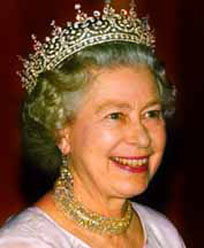 There is massive interest in the British Royal family not only here at home but across the rest of the world too. Click here to see a German news report for kids explaining the life of Queen Elizabeth (Königin Elizabeth).
There is massive interest in the British Royal family not only here at home but across the rest of the world too. Click here to see a German news report for kids explaining the life of Queen Elizabeth (Königin Elizabeth).
Montag, 4. Juni 2012
wort der woche: vogel
However you might be happy to be known as a Spaßvogel. The life and soul of the party a Spaßvogel knows how to have fun and is known as a bit of a joker. Spaß is the German word for fun, and you might wish somebody Viel Spaß! (literally much fun!)
 |
| The early bird catches the worm
|
Staying on the subject of animals you might know that a Spinne is a spider and a Vogelspinne is the notorious bird-eating spider from Australia. This giant spider would fit snugly into the palm of a man's hand but you might prefer it to keep away. Its venomous fangs can grow up to 1.5 inches long, and although the poison is fairly harmless to humans it would be as unpleasant as being stung by a wasp. Despite its name the Vogelspinne does not usually eat birds. In the wild it uses its deadly fangs to kill and consume small rodents, lizards and bats as well as insects. In captivity Vogelspinnen live off a diet of cockroaches, crickets and other insects.
 |
| Die australianische Vogelspinne |
Dienstag, 29. Mai 2012
wort der woche: fahrrad
I remember my first Fahrrad. It was passed down to me from my sister and had solid tyres. I spent hours riding it round the garden and perfected the art of cycling with a cardboard box over my head. Until one day I steered the bike right over the edge of the lawn and dropped four foot, landing in a flower bed.
Fahrrad comes from das Rad which means the wheel and fahren meaning to go or to drive.
Germans often talk about their Rad just as we in England shorten bicycle to bike.
In German towns you will see dozens of bicycles. Most cities have constructed cycle ways which are called Radwege. These safe cycling routes often have their own traffic lights and cyclists in Germany are generally more noticeable and treated with more respect by motorists than they are in the UK.
The Donauradweg is a beautiful cycling route which runs beside the river Danube through Germany and Austria.
If you want to hear more about cycling in Germany why not listen to Annik Rubens' podcast on Radfahren (cycling)?
Montag, 28. Mai 2012
meine haustiere
You may already know the words for pets pretty well. When you say which pet you have you need to remember whether you use einen, eine or ein before the name of the pet.
All nouns in German belong to one of three groups. These groups are called masculine, feminine and neuter.
In all my teaching resources I use blue with masculine nouns, red with feminine nouns and green with neuter nouns.
Click here to view my powerpoint to help you practise talking about pets you have.
All nouns in German belong to one of three groups. These groups are called masculine, feminine and neuter.
In all my teaching resources I use blue with masculine nouns, red with feminine nouns and green with neuter nouns.
Click here to view my powerpoint to help you practise talking about pets you have.
Donnerstag, 24. Mai 2012
wort der woche: regenschirm
You might need to take a Regenschirm along with you if the
weather forecast predicts Regenschauer. It would also be useful
in a Schneeschauer or a Hegelschauer.
Another German compound word, Regenschirm is made up of two words. Regen means rain and a Schirm is a shield or a mask. So, put together a Regenschirm will shield you from the rain. What do you think a Sonnenschirm might be?
Rain being very widespread in Germany there are other compounds beginning with Regen. A Regenjacke can easily be packed in a bag and taken out with on excursions. And in the garden you might want to collect Regenwasser in a Regentonne.
After a period of Regenfall you might spot a few Regenwürme wriggling around on the earth in your garden.
American writer and humorist Mark Twain wrote of bankers « Ein Bankier ist ein Mensch, der seinen Schirm verleiht, wenn die Sonne scheint und der ihn sofort zurückhaben will, wenn es zu regnen beginnt.»
Another German compound word, Regenschirm is made up of two words. Regen means rain and a Schirm is a shield or a mask. So, put together a Regenschirm will shield you from the rain. What do you think a Sonnenschirm might be?
Rain being very widespread in Germany there are other compounds beginning with Regen. A Regenjacke can easily be packed in a bag and taken out with on excursions. And in the garden you might want to collect Regenwasser in a Regentonne.
After a period of Regenfall you might spot a few Regenwürme wriggling around on the earth in your garden.
American writer and humorist Mark Twain wrote of bankers « Ein Bankier ist ein Mensch, der seinen Schirm verleiht, wenn die Sonne scheint und der ihn sofort zurückhaben will, wenn es zu regnen beginnt.»
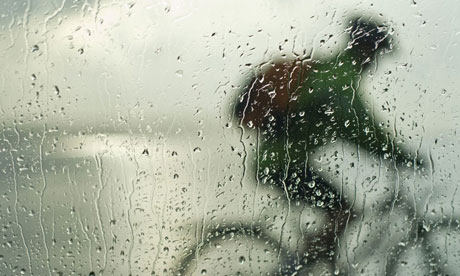 |
| Radfahrer im Regenschauer |
Freitag, 18. Mai 2012
zwanzig zwerge

Can you get your mouth round this tricky tonguetwister?
Zwanzig Zwerge zeigen Handstand, zehn im Wandschrank, zehn am Sandstrand.
Click here to hear the tonguetwister.
Mittwoch, 16. Mai 2012
battenbergkuchen
Many of us have tasted the sweet, almond-infused delights of Battenberg Cake. The distinctive sponge, coloured pink and yellow, has an outer shell of marzipan.
It was created by British chefs in 1884 to honour the wedding of Viktoria von Hessen-Darmstadt (Queen Victoria's grand-daughter) to Prince Ludwig Alexander von Battenberg. The four pink and yellow squares in the cake represent the Battenberg Princes Ludwig Alexander, Alexander Joseph, Heinrich Moritz and Franz Joseph.
During World War One anti-German feeling grew in Britain and Prince Ludwig von Battenberg changed his name to Mountbatten. The cake continued to be called Battenberg and thanks to Mr Kipling and his exceedingly good team it remains a popular tea-time treat today.
Next week chefs in Year 5 will be following a German recipe for Battenberg cake and creating their own versions to be frozen and kept for the Jubilee picnic to be held at school in June.
It was created by British chefs in 1884 to honour the wedding of Viktoria von Hessen-Darmstadt (Queen Victoria's grand-daughter) to Prince Ludwig Alexander von Battenberg. The four pink and yellow squares in the cake represent the Battenberg Princes Ludwig Alexander, Alexander Joseph, Heinrich Moritz and Franz Joseph.
During World War One anti-German feeling grew in Britain and Prince Ludwig von Battenberg changed his name to Mountbatten. The cake continued to be called Battenberg and thanks to Mr Kipling and his exceedingly good team it remains a popular tea-time treat today.
Next week chefs in Year 5 will be following a German recipe for Battenberg cake and creating their own versions to be frozen and kept for the Jubilee picnic to be held at school in June.
Dienstag, 15. Mai 2012
wort der woche: pumpernickel
A dark, chewy, moist and slightly sweet mouthful is Pumpernickel. A very German treat, and some say it is an acquired taste. The bread is made with coarse rye flour and its dark colour comes from a very long baking time.
In the USA Pumpernickel has become popular and is usually sweetened and darkened with cocoa powder, molasses or coffee. In the States and parts of Europe the bread is available in delis and chic eateries, although in Germany and Poland it is still everyday fare. Here in the UK it can be bought at German supermarkets like Lidl and Aldi.
Pumpernickel tastes delicious on its own, toasted, or with cheese, cold meats, smoked salmon. To make your own version of the bread try the recipe by Deb from Smitten Kitchen.
In the USA Pumpernickel has become popular and is usually sweetened and darkened with cocoa powder, molasses or coffee. In the States and parts of Europe the bread is available in delis and chic eateries, although in Germany and Poland it is still everyday fare. Here in the UK it can be bought at German supermarkets like Lidl and Aldi.
Pumpernickel tastes delicious on its own, toasted, or with cheese, cold meats, smoked salmon. To make your own version of the bread try the recipe by Deb from Smitten Kitchen.
Sonntag, 6. Mai 2012
wort der woche: das treppenhaus
Treppenhaus is one of scores of German compound nouns, that is a noun made up of two or more nouns. Treppe means stairs and Haus means house. Put together they describe the hallway of a building shared by multiple occupiers. If the building has several Klingelknöpfe (doorbells) then you can expect to walk into a shared Treppenhaus on entering the building.
In many old town houses which have been divided up into apartments the Treppenhaus might contain several lockable letterboxes. The Briefträger (postman/woman) can then easily deliver mail to all the residents of a large house without having to climb five or six sets of stairs in each building.
Another feature of German Treppenhäuser is the light switches. There is a light switch on each landing so that anybody entering or leaving the building can switch on the stair lights. After two minutes the lights then go off automatically, saving electricity and cutting down on waste. Legendary German efficiency.
 |
| Elegant art nouveau staircase in Vienna |
Dienstag, 1. Mai 2012
german and english words 1
German and English words can sometimes look quite similar. Look at these German words and see if you can guess what they mean in English. Scroll down the page when you have had a go and see if you were right.
1. hier
2. das Bier
3. der Wein
4. der Sommer
5. die Zigarette
6. der Hund
7. das Papier
8. lang
9. braun
10. der Fisch
11. das Insekt
12. das Schwein
13. der Garten
14. die Lampe
15. das Bad
16. die Idee
17. die See
18. der Balkon
19. das Feld
20. das Gras
21. der Kanal
22. der Reis
23. der Honig
24. der Traktor
25. der Apfel
1. here
2. the beer
3. the wine
4. the summer
5. the cigarette
6. the dog (hound)
7. the paper
8. long
9. brown
10. the fish
11. the insect
12. the pig (swine)
13. the garden
14. the lamp
15. the bath
16. the idea
17. the sea
18. the balcony
19. the field
20. the grass
21. the canal
22. the rice
23. the honey
24. the tractor
25. the apple
How did you get on? Did you notice that if you are trying to work out the English meaning of a German word you might only need to change one or two letters? Sometimes the English word is very old - like swine and hound.
1. hier
2. das Bier
3. der Wein
4. der Sommer
5. die Zigarette
6. der Hund
7. das Papier
8. lang
9. braun
10. der Fisch
11. das Insekt
12. das Schwein
13. der Garten
14. die Lampe
15. das Bad
16. die Idee
17. die See
18. der Balkon
19. das Feld
20. das Gras
21. der Kanal
22. der Reis
23. der Honig
24. der Traktor
25. der Apfel
1. here
2. the beer
3. the wine
4. the summer
5. the cigarette
6. the dog (hound)
7. the paper
8. long
9. brown
10. the fish
11. the insect
12. the pig (swine)
13. the garden
14. the lamp
15. the bath
16. the idea
17. the sea
18. the balcony
19. the field
20. the grass
21. the canal
22. the rice
23. the honey
24. the tractor
25. the apple
How did you get on? Did you notice that if you are trying to work out the English meaning of a German word you might only need to change one or two letters? Sometimes the English word is very old - like swine and hound.
Montag, 30. April 2012
wort der woche: mohnbrötchen
As well as Mohnbrötchen you may see weiche Brötchen on the menu. These are soft rolls and much easier to chew. What do you think is sprinkled onto a Sesambrötchen?
Can you spot any of these delicious morsels in the picture below?

Orangensaft
Käse
Müsli
Tee
Kaffee
Joghurt
Honig
ein gekochtes Ei
Tomatensaft
Knäckebrot
Äpfel
Donnerstag, 29. März 2012
willy puchners farbenlehre

The Austrian artist and illustrator of children's books always has his paints at hand on his travels round the world. You can see more of his fascinating creations on the Frankfurter Allgemeine Zeitung website.
wischi wischi waschi wischi
Freitag, 24. Februar 2012
Winterwetter auf Rügen
Es ist sehr, sehr kalt im Winter. Das Meer friert und es schneit sehr viel.
Rügen
Painter Caspar David Friedrich's picture Kreidefelsen auf Rügen made the chalky white cliffs on the island famous and today there are numerous seaside resorts around the island. The cliffs at Rügen are as high as 161 metres above sea level (about as high as the Blackpool Tower) and you can follow a clifftop coastal path to enjoy wonderful sea views and enjoy some delicious German fare in the Waldhalle Gaststätte.
 |
| Weiße Felsen auf Rügen |
 |
| Caspar David Friedrich's painting: Kreidefelsen auf Rügen |
 |
| Gasthaus Waldhalle |
Abonnieren
Posts (Atom)
